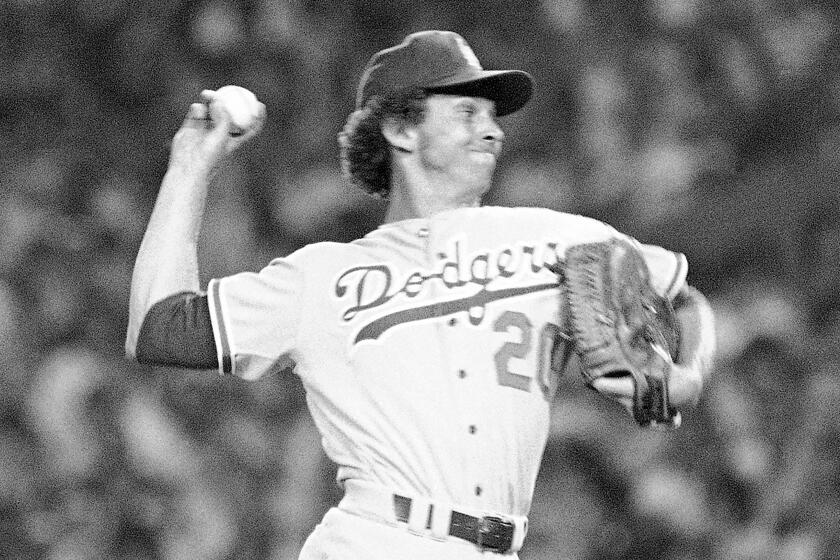Offerman’s Blue Shadow : Amalfitano Does His Best to Ensure That the Dodgers Will Not Be Caught Short
- Share via
VERO BEACH, Fla. — The baseball man with the gray sideburns stands behind the young, wide-eyed shortstop and shouts in a voice strong enough to span generations.
“That’s it!” Joe Amalfitano shouts. “That’s how you do it! You see there? Do you see it?”
Jose Offerman sees it. He takes the throw in front of second base and returns it to home plate, where the catcher makes the tag.
Last year Offerman’s return throw often went into the screen. Other times, he was too paralyzed to even make a throw.
But this spring the ball is finding the glove, and Offerman says he is finding himself.
And Amalfitano, the Dodger coach who hopes to turn a rattled kid into a major leaguer, is rediscovering an old love.
“I am more charged up this spring than I have been in a long time,” Amalfitano said recently. “I always said coaching was more than just hitting fungoes in batting practice. Coaching is passing along knowledge.”
The teacher and the pupil are an unlikely pair, brought together by the Dodgers’ fear that the team is headed for infield disaster.
Offerman is 23. Amalfitano has been coaching for 23 years, including nine as the Dodgers’ third base coach.
Offerman has been named the Dodgers’ starting shortstop despite a .181 average and 14 errors last season. Amalfitano is a former major league middle infielder who was never known for wild swings or errors.
At the end of last season, teammates were sniping about Offerman’s work ethic. He was a minor league star with a major league attitude problem. He became the project nobody in the organization wanted.
This winter, Amalfitano said he wanted him.
“The kid has tools, my gosh, does he have tools,” Amalfitano said. “He just needs to learn how to think. And react. And enjoy.”
Amalfitano cringes these days when he sees players not preparing for games. Players hugging their opponents before games. Players who say they are disappointed at million-dollar contracts.
“If you don’t turn your head a lot, you go goofy,” he said.
But in Offerman, he sees a new generation. Another chance.
“Who knows,” Amalfitano said, “maybe I can help him.”
“Already,” Offerman said, “Joey has helped me.”
The Dodgers hope to start seeing evidence in today’s spring opener against the Atlanta Braves at West Palm Beach.
“He is one of the most important parts of this team, and everybody knows it,” Darryl Strawberry said. “The shortstop job is his. Now he has to keep it by showing he can stay in the game mentally.”
Amalfitano, who has a longer tenure than any active coach, assumed the duties of infield coach this winter after Bill Russell departed to manage at Albuquerque.
He was one of the first people to meet Offerman this spring.
“I told him he was like a butterfly,” Amalfitano said. “He is already beautiful, but he is more beautiful when he flies. I told Jose we were going to get him to fly.”
Since then, Amalfitano has been one of the last people Offerman has seen each day. There have been repetitive infield drills, impromptu chats.
“There has been a link established between those two,” said Fred Claire, Dodger vice president. “And it has relaxed Jose. He is smiling more. He is laughing more. I think he is feeling more at home.”
Sometimes it is almost as if Amalfitano is the youngster and Offerman is the veteran.
Amalfitano pushes, prods, strokes, pointing his fungo bat as if it were a sword. Offerman smiles and quietly makes all the plays.
“Finally, they are letting me play my way,” Offerman said. “Joey is telling me to play how I feel comfortable.
“Last year, Billy tried to get me to play shortstop like he played shortstop. I was confused. I am no longer confused.”
Dodger coaches are confused about that last remark. Amalfitano and Russell agree that their technical approach has been the same.
“But if he feels better with Joey, that’s great,” Russell said. “Everybody in the organization is pulling for the kid. Whatever it takes.”
Russell is understating the case. Hoping to build his confidence, the Dodgers have done everything for Offerman but retire his number.
Some examples:
--They did not re-sign shortstop Alfredo Griffin because they didn’t want Offerman to feel a “shadow,” according to Claire.
A veteran player put it another way.
“Last season everyone wanted Alfredo to play, so everyone looked for everything Jose did wrong,” the player said.
--During the winter in the Dominican Republic, the Dodgers’ Licey team traded 10 players, including George Bell, to La Romana in a deal for Offerman.
“Our coaches want to go to work on his mental approach as soon as we could,” said Ralph Avila, the Dodger vice president for Latin American affairs.
--Claire has asked the team’s pitchers--particularly those who give up a lot of ground balls--to help build Offerman’s confidence.
Among those is pitcher Tim Crews, who had publicly criticized Offerman last winter.
--Brett Butler has worked with Offerman on his bunting early each spring morning.
--Eric Davis has met with Offerman about his hitting approach, encouraging more line drives and fewer home run swings.
“We feel that if all of us give him support, his talent will take over,” Claire said.
Since making his debut with a home run against the Montreal Expos’ Dennis Martinez on Aug. 19, 1990--his only home run--Offerman said he has rarely felt this support.
He committed three errors in his first three major league games and played little for the rest of that season.
Last year, after being touted as the Dodgers’ starting shortstop in the spring, he lost the job to Griffin and never gained his teammates’ confidence during 52 major league games.
He made 13 errorless starts in mid-May while replacing Griffin, who had suffered a hand and a toe injury. But when Griffin returned, Offerman was sent back to triple-A Albuquerque a week later and sulked the rest of the season.
“I think if he had stayed here then, his confidence level would have different,” Claire said.
Claire met with Offerman during a late-season trip to Albuquerque.
“I told him he had my total support as long as I have his all-out effort,” Claire said.
The talk didn’t appear to work. Offerman returned to the Dodgers on Aug. 6 and committed seven errors during the remainder of the month.
“In this game you’ve got to come to the park ready to play, you’ve got to get into the game before the game,” Strawberry said. “Not talking specifically about Jose, but if you don’t do that, players notice.”
Offerman said his problem was that everybody was noticing him too much.
“They put a lot of pressure on me, everything I did, I had to be perfect,” Offerman said. “Then when I played well, they did not appreciate it. It is hard to play like that. It is impossible to be perfect.”
According to Butler: “What happened was obvious. The kid was petrified.”
Now it is the Dodgers who are quietly petrified. If Offerman does not live up to expectations, they have only veteran Dave Anderson in reserve.
Until Offerman proves himself, their infield and perhaps their season are in danger of collapse.
“We are not worried,” Claire contended. “This is Jose’s time to play. He is ready.”
Don Kessinger doesn’t know Jose Offerman. But he also bets the kid will be ready.
As a young shortstop with the Chicago Cubs in the 1960s, Kessinger was having trouble with his footwork. He could not make the play in the hole.
A Cub veteran began working with him, coaxing him, pushing him, testing him.
“He hit me a thousand ground balls a day, every day, during one spring,” Kessinger said. “He pulled out a stopwatch and figured out how I could get to the ball fastest. He talked to me about situations, about using my head, about not getting down.”
“I would never have made it as a major leaguer without that kind of great coaching.”
Kessinger became a six-time All Star, and today he laughs at a certain irony.
“I became known for making that play in the hole,” he said.
And for that, he thanks Joe Amalfitano.
“If a player fails, I fail,” Amalfitano said. “I told Jose, I will be out there working as long as he wants to stay.”
More to Read
Are you a true-blue fan?
Get our Dodgers Dugout newsletter for insights, news and much more.
You may occasionally receive promotional content from the Los Angeles Times.











